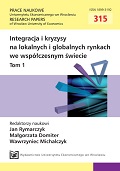Znaczenie globalnych reguł prowadzenia wymiany handlowej ze szczególnym uwzględnieniem KNU dla krajów rozwijających się
The importance of global trading rules with special regard to the most favoured nation clause for developing countriesThe Most Favoured Nation (MFN) c
Author(s): Małgorzata DomiterSubject(s): Economy
Published by: Wydawnictwo Uniwersytetu Ekonomicznego we Wrocławiu
Keywords: trade policy; trade policy rules; developing countries; MFN
Summary/Abstract: The Most Favoured Nation (MFN) clause is present in international relations from the late Middle Ages in the links among European countries. Since that time, it has been widely utilised in the bilateral non-preferential trade. It has also been used in the trading system aspiring to regulate broad, even global, trade relations. MFN is not an institution of international law, of particular relevance for underdeveloped countries. MFN does not play a leading role in trade with developing countries, and also often acts as negative for those countries. On the one hand, it is still quite a high level of tariffs on agricultural goods which are often the main export commodity of the developing countries. In addition, the liberalization of tariffs on the basis of MFN for underdeveloped countries causes that they lose the possibility of adequate protection of their domestic markets.
Journal: Prace Naukowe Uniwersytetu Ekonomicznego we Wrocławiu
- Issue Year: 2013
- Issue No: 315 vol 1
- Page Range: 208-222
- Page Count: 15
- Language: Polish

